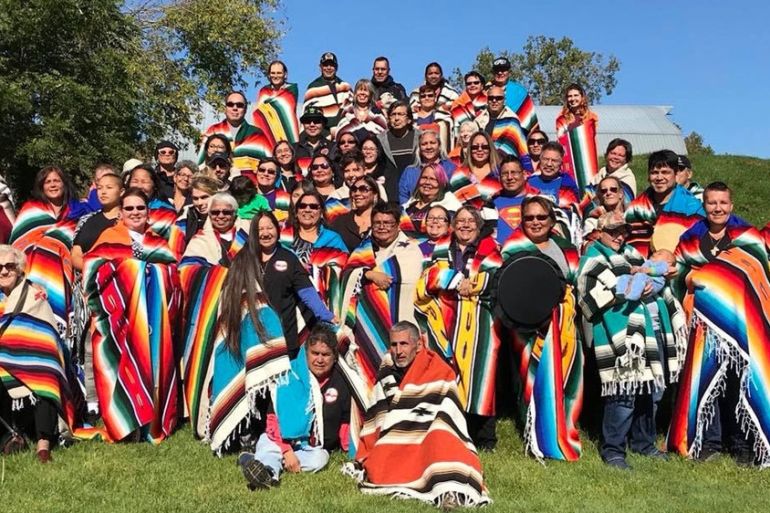Canada: Sixties Scoop survivors want ‘just reparations’
Sixties Scoop vow to block financial settlement until the government holds more inclusive consultation process.

Survivors of a Canadian policy that forcibly placed thousands of Indigenous children into foster and adoptive homes decades ago are calling on the government to relaunch a consultation process, after some survivors were excluded from a recent multi-million-dollar settlement.
The National Indigenous Survivors of Child Welfare network, an organisation based in Ottawa, said on Friday it wants “a just and inclusive reparations package from Canada” for all the survivors of what is known as the Sixties Scoop.
Keep reading
list of 4 itemsIndigenous people in Philippines’s north ‘ready to fight’ as tensions rise
Curfew announced for under-18s in Australia’s Alice Springs after unrest
‘We exist’: A Himayalan hamlet, forgotten by Indian democracy
“The message really is that we need to be heard and that it’s important that we’re heard and that we’re taken seriously,” Duane Morrisseau-Beck, cofounder and director of the NISCW network, told Al Jazeera.
The group said it would seek to stop a recent $640m settlement proposal reached between Ottawa and some Sixties Scoop survivors “until proper consultation takes place”. The settlement did not include the Metis and non-status Indigenous peoples.
The Sixties Scoop denotes a period during which Canada’s child welfare agencies took thousands of Indigenous children away from their families and placed them into mainly non-Indigenous homes.
The removals largely took place between the 1960s and 1980s.
The Sixties Scoop children were placed into homes across Canada and abroad and many were never told about their Indigenous roots.
Some also suffered from emotional, physical and sexual abuse.
The NISCW network is also organising a national day of solidarity next month for the survivors. Rallies will be held in cities across Canada on March 16, the group said.
Morrisseau-Beck, a Sixties Scoop survivor who was taken from his family as a newborn in Manitoba, a province in central Canada, only discovered he was Metis – of mixed, Indigenous-European ancestry – as an adult.
“When we look at the cost to our physical, spiritual, mental wellness, what’s missing out of this [settlement] is the physical, sexual and psychological abuses that we’ve suffered. People don’t seem to understand the gravity of the situation,” Morrisseau-Beck said.
‘The first step’
In October, the federal government announced a $640m settlement agreement with Sixties Scoop survivors, after individuals had brought a class-action lawsuit against Ottawa.
The settlement came after a court in Ontario, Canada’s most populous province, ruled that the children involved in the Sixties Scoop were denied their language and culture and lost their Indigenous identity as a result of the policy.
But the settlement agreement did not include Sixties Scoop survivors who are Metis or non-status (people whose indigenity is not legally recognised by the government), which has led to some anger and resentment.
“It’s not about a settlement agreement; it’s about justice for Sixties Scoop survivors,” Morrisseau-Beck added.
Stephanie Palma, media relations officer at Indigenous and Northern Affairs Canada, a government ministry, said the proposed settlement is “the first step” in resolving the issue.
“The Sixties Scoop is a dark and painful chapter in Canada’s history and resolving these cases is a vital step in our journey of reconciliation with Indigenous peoples,” she told Al Jazeera in an email.
“The Government of Canada is aware that there are other Sixties Scoop claims that remain unresolved, including those of the Metis and non-status.”
Greater consultation
Colleen Cardinal, a Sixties Scoop survivor and member of the NISCW network, said the settlement “leaves out a lot of survivors”, including many “who don’t know where they come from and who their family is and because of that, they don’t have status”.
Many survivors feel the government never consulted them on the settlement proposal, Cardinal told Al Jazeera, and they are confused about how the settlement process works.
“If the federal government wants to make this right, they should have a process where they are involving survivors in what they need,” Cardinal told Al Jazeera earlier this week.
A request to meet Canada’s minister for relations between the government and Indigenous peoples to chart a way forward has so far gone unanswered, she said.
“Survivors are the ones that went through it, not the federal government. We are the ones who are most impacted,” she said.
“Right now, survivors don’t feel like we have any say.”